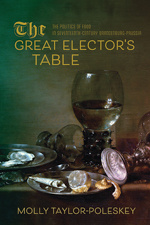Today, we are happy to bring you our conversation with Molly Taylor-Poleskey, author of The Great Elector's Table: The Politics of Food in Seventeenth-Century Brandenburg-Prussia
What inspired you to write this book?
I had no idea I would write this particular book when I started. I was initially just interested in cultural exchange in the early modern period, but it turns out, it’s very hard to track such an intangible and dynamic thing. My “ahah” moment came when I pulled printed ordering forms of a court steward in Dessau on which he would enter the quantity of milk, eggs, and other staples he needed in the kitchen. A course with Paula Findlen about “Early Modern Things” had taught me that material objects are revealing subjects for historical study. Plus, I was living in northern California at the time where people were talking about food nonstop and I knew it was really a way of sharing their values. Although food obviously doesn’t exist from early modern Europe, as the most expensive part of any early modern household, it was carefully tracked at larger households, leaving a great papertrail of cultural consumption and exchange!
What did you learn and what are you hoping readers will learn from your book?
Food gave me a concrete way to enter into this world and see how the everyday habits of the ruler were related to the running of the state. Because of how western nations developed in Europe in the 19th century, there’s a lingering idea that political and private life are separate spheres, but the early modern records show this was not the norm prior to that. Furthermore, every member of court was part of that political culture. As opposed to modern day western society that claims to have more social mobility, but where the labor that supporting elite lifestyles is often hidden, in early modern Europe, the relationships might have been more unequal, but they were more intimate.
What’s your favorite anecdote from your book?
Learning precisely what people in Berlin ate 300 years ago always kept me engaged in the work because it was so visceral--butter on salad?! Beer soup for breakfast?! No pasta or potatoes?! However, the most rewarding part was getting to trace the lives of forgotten food servants who, while agents of the court, also had their own interests. My favorite was the Dutch baker, Martin Hones, who wrote numerous, bloated complaints to the Great Elector about his (sometimes violent) altercations with local bakers in Königsberg. As a historian, I’m grateful for his dramatic litanies that so clearly show the dispute between the court and city guilds. But, personally, I found myself taking the side of guild bakers because Hones was such a pill!
What’s next?
While drafting the conclusion to this book, I wrote a few paragraphs about a suspected poisoning of one of the Great Elector’s sons in the last year of his reign. Thanks to the comments of one of my readers, I fell down a rabbit hole while revising the book for UVA Press. I went back to the archive and uncovered an entire investigation into the suspicious death of this forgotten Prince Ludwig. Although the episode has been greatly mythologized in Prussian history, much of what is repeated is false. My next book retells the story with the overlooked eyewitness accounts that bring the last week of the prince’s life into sharp relief. The archived accounts of the death and ensuing scandal evidence the gendered notions of rule, dynastic rivalries, and salacious everyday interactions between rulers, spies, servants.




